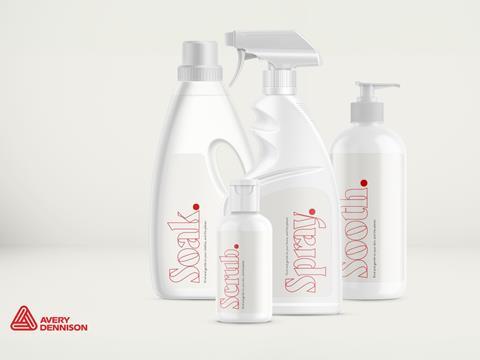
A semi-industrial trial conducted by Avery Dennison and the National Test Center Circular Plastics (NTCP) suggests that the former’s standard adhesion filmic labels are released from rigid HDPE packaging during hot and cold recycling processes, resulting in clean recycled flakes.
50,000 white HDPE bottles featuring different combinations of filmic face materials and emulsion adhesives were used in the trial. According to its results, all of Avery Dennison’s standard adhesion filmic labels are separated from HDPE packaging during recycling processes, and this is not thought to impact the resealability of the label in hot or cold recycling temperatures.
From this, the companies conclude that design for recycling guidelines regarding HDPE packaging decoration could be updated – and that FMCG brands may not need to implement separate labelling solutions to ensure the recyclability of their packaging.
Mechanical stress must be considered in testing protocols as a critical factor in label resealability, Avery Dennison adds.
“These results challenge the widely held belief that self-adhesive labels do not separate from HDPE packaging during the cold temperature washing step in the recycling process,” says Alena Maran, director of Strategy and Sustainability at Avery Dennison, EMENA. “Until now, we did not have fact-based evidence that showed how our labels react during the multiple steps in the recycling process.
“We can now clearly see that the requirements in existing design for recycling guidelines and test protocols for wash-off labels are not necessarily representative of the full-scale HDPE recycling process.”
Freek van Rhijn, technical director at NTCP, continues: “Using our semi-industrial recycling line, we work to find ways to improve the sorting and washing of plastics during the recycling process. We welcome the research questions and cooperation with Avery Dennison on this scientific trial, one of the largest and most extensive label releasability trial on an industrial scale ever performed in Europe so far.”
Avery Dennison also clarifies that the subsequent steps during the recycling process, such as extrusion, were not assessed in the trial, and that its results apply under the condition that the label in question has passed sorting requirements.
It will delve further into the results of the semi-industrial trial – and talk about the role of labels in designing for recycling – in a live event hosted alongside Packaging Europe on 6th March.
Another development in recycling technologies saw Professor Edward Kosior and Paul Marshall from Nextek and NEXTLOOPP speak to Packaging Europe about PolyPPrism, a patented fluorescent tracking system in which on-pack markets and a polymer’s spectroscopy response are utilized to sort a mixed waste stream.
After this point, a high-performing decontamination process involving two high-temperature extrusion stages under high vacuum seek to remove volatile and semi-volatile compounds from polypropylene waste. It is hoped that the process will result in clean, food-safe recyclate for further packaging applications.
Bostik also unveiled its first wash-off label adhesive for all temperatures last year. Certified as compatible with PET bottle label recycling by the Association of Plastic Recyclers, the water-based, acrylic technology serves as a wash-off solution for cold-fill or freezer-grade applications that require an adhesion temperature of 4.4°C or lower.
Other recent developments from Avery Dennison include the launch of its new, end-to-end Digital Product Passport as a Service; and its work with Levi Strauss & Co to produce an NFC-chip-enabled patch that unlocks a premium experience for San Francisco 49ers season ticket holders at the tap of a smartphone.
If you liked this article, you might also enjoy:
The Lidl approach to packaging sustainability
How did Brazil achieve its 100% aluminium can recycling rate – and can it be replicated in the EU?
Experts have their say on the EU’s Packaging and Packaging Waste Directive revisions
A deep dive into the most important packaging sustainability trends and solutions














No comments yet